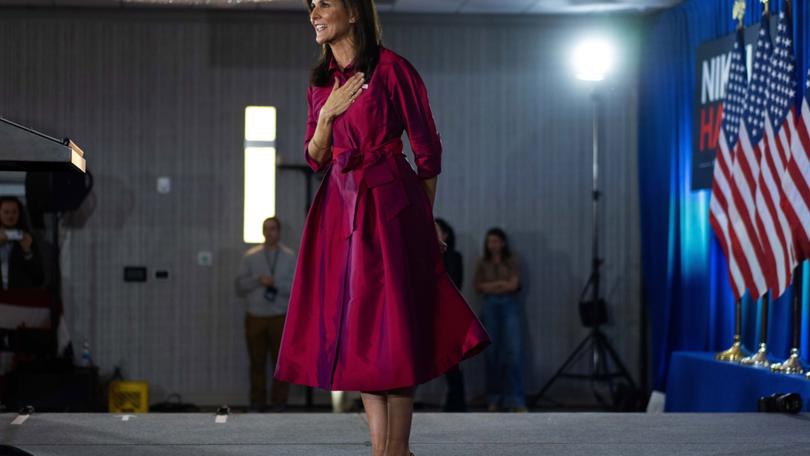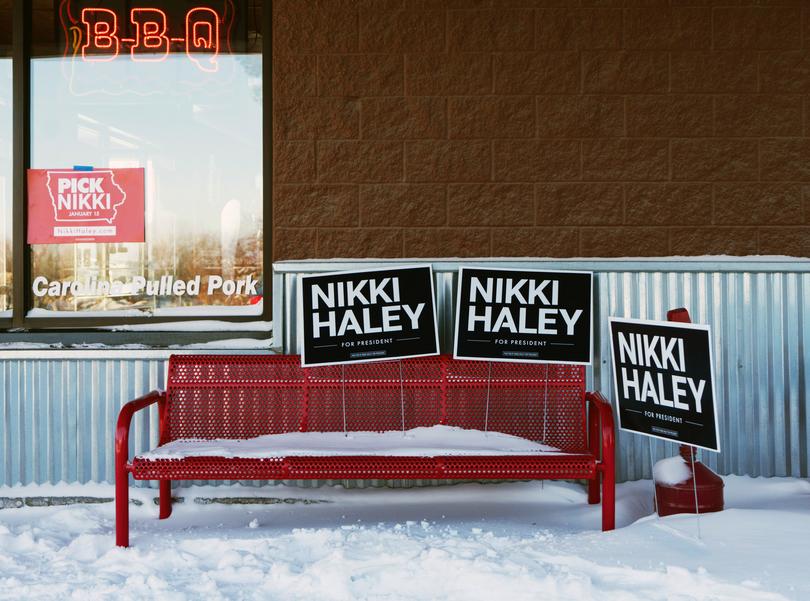The New York Times: Nikki Haley’s missed opportunity as Iowa slows her roll into New Hampshire
Nikki Haley’s disappointing third-place finish in the Iowa caucuses showed that for all the hype, her momentum ultimately stalled in the face of a Republican electorate in the thrall of the former president.

Nikki Haley had hoped to vault into New Hampshire before next Tuesday’s first-in-the-nation primary with a head of steam from a second-place finish in Iowa and a powerful case to make that the 2024 nomination fight was a two-candidate race between her and Donald Trump.
Instead, as Haley hobbles into New Hampshire, the pressure is on to show she can compete with Trump.
Her disappointing third-place finish in the Iowa caucuses Monday showed that for all the hype, her momentum ultimately stalled in the face of a Republican electorate still in the thrall of the former president. That included not only Trump’s working-class base but also the bastions of college-educated Republicans in and around Des Moines that she was supposed to dominate.
Sign up to The Nightly's newsletters.
Get the first look at the digital newspaper, curated daily stories and breaking headlines delivered to your inbox.
By continuing you agree to our Terms and Privacy Policy.In her speech after the caucuses, Haley, the former governor of South Carolina, sharpened her attack on Trump, questioning his age and his ability to unite a fractured country. She lumped Trump with President Joe Biden as backward-looking barriers to an American revival.
“The question before Americans is now very clear: Do you want more of the same or do you want a new generation of conservative leadership?” she asked, drawing loud applause and chants of “Nikki, Nikki.” “Our campaign is the last best hope of stopping the Trump-Biden nightmare.”
Still, Haley’s final tally in Iowa most likely breathed some new life into the campaign of her rival, Gov. Ron DeSantis of Florida, and indicated that, for all the excitement around her campaign in the closing weeks, her pitch may have limited appeal with Republicans.
With more than 95% of precincts reporting late Monday, Haley had 19% of the vote, Trump 51% and DeSantis 21%. Vivek Ramaswamy, a tech entrepreneur and political newcomer who has relentlessly traveled the state on a largely self-funded bid, came in fourth, with 7.7%, then dropped out and endorsed Trump.
Haley’s allies on Monday projected confidence that she was headed into more favorable territory in New Hampshire, where she hopes to turn the race into a head-to-head against Trump. The state’s Republicans are more moderate and less religious, and independents can vote in the primary, all factors that may work to Haley’s advantage.
“New Hampshire and Iowa are two very different states,” said Kimberly Rice, her campaign’s co-chair in New Hampshire.
“It is a 2-point difference,” said Rep. Ralph Norman, R-S.C., referring to the gap separating Haley and DeSantis. And he argued it was DeSantis “who put his eggs in only one basket” — his campaign spent heavily in Iowa.
For Haley, who served as Trump’s first ambassador to the United Nations, a steady underdog campaign, aided by the struggles of DeSantis’ operation, was not enough to win over a very conservative Republican electorate driven by social issues like abortion and shaped by evangelical sensibilities.

She also may have faced the long-standing skepticism of Republican voters toward female candidates. After a Haley campaign stop in Waukee, Iowa, last week, Bruce Norquist, 60, a cybersecurity consultant from Urbandale, Iowa, said Haley was not strong, citing the threats posed to the country by disinformation campaigns from China and Russia and what he said were efforts to tamper with voting machines.
“I’m worried Nikki Haley isn’t skeptical enough,” he said. “Democracy is at stake.”
The final Iowa Poll conducted by The Des Moines Register, NBC News and Mediacom showed her finishing second, but, under those headline numbers, the survey attested to serious problems for Haley.
Only 9% of her supporters said they were extremely enthusiastic about voting for her. Most said they were mildly enthusiastic or not enthusiastic at all. On Caucus Day, enough of those voters either failed to show up or switched their votes.
That was not the case for Trump’s voters, who have shrugged off any worries about nominating a former president facing 91 felony counts from four criminal prosecutions, a looming fraud judgment that could dismantle his New York real estate empire and a pending decision on the defamation of a woman he has already been held liable for sexually abusing.
The site of her caucus watch party provided early signals of her finishing position. Just as Haley supporters were expected to gather in an elegant ballroom at one end of the hotel, caucusgoers were leaving a room down the hall, where Trump had clinched victory with 16 votes. DeSantis came in second with 14, and Haley came in third with eight.
The final days of the Iowa campaign were shaped by the fight for second place and the increasingly vitriolic charges and countercharges between Haley and DeSantis over the airwaves and in press interviews.
Until recent months, Haley appeared to be struggling to make up ground in Iowa, but a burst of momentum in the polls, both in Iowa and across the country, had created expectations she could not meet. Americans for Prosperity, the conservative network backed by the fortune of billionaires Charles and David Koch, endorsed her and spent more than $150,000 in the final weeks on a door-knocking and get-out-the-vote drive.
DeSantis, who bet his candidacy on the state, built a formidable ground operation and won the endorsements of Gov. Kim Reynolds and Bob Vander Plaats, an influential leader of Iowa’s Christian right.
Haley took a penny-pinching approach, keeping her operation lean and her overhead costs low. She and her crew flew commercial and stayed at affordable hotels. She left most of the advertising spending to her allied super political action committee until just before the holidays. Haley, a former accountant, obsessed over the campaign budget and often audited spreadsheets of expenses line by line, her senior campaign officials said. She received a daily email with how much money the campaign had raised the previous day, and on a weekly basis reviewed a more detailed campaign budget.
The approach was a stark contrast from that taken by DeSantis, who since the early days of the campaign has been flying on private planes and traveling across Iowa on campaign buses (including one paid for by his allied super PAC), and who would eventually be forced to make staffing cuts while facing a cash crunch. But those investments ultimately paid dividends.

After the first national Republican debate in August in Milwaukee, Haley’s fundraising soared, crowds started to pick up at campaign events and she began to climb in the polls, particularly in New Hampshire.
But those were not the voters who showed up to caucus. Haley’s argument that she was the best Republican to thwart Biden’s reelection may have been persuasive with college-educated Republican voters, 39% of whom backed her in a New York Times/Siena College poll released last month.
But in a wider Republican electorate that has been transformed by Trump into a bastion of voters without a college education, Haley, in the Times/Siena poll, had the support of just 3% of those voters.
The voters she had tepidly won over expressed their doubts. Sitting on a tall stool in Pella, Iowa, Bryan Healy, 70, a retired manufacturing business owner who voted for Trump in 2016 and Biden in 2020, said Haley needed to be more aggressive toward a “dangerous” and “autocratic” Trump.
“It’s time for Nikki to stop running for vice president — she’s got to swing for the fence,” he said.
This article originally appeared in The New York Times.
© 2023 The New York Times Company
Originally published on The New York Times
